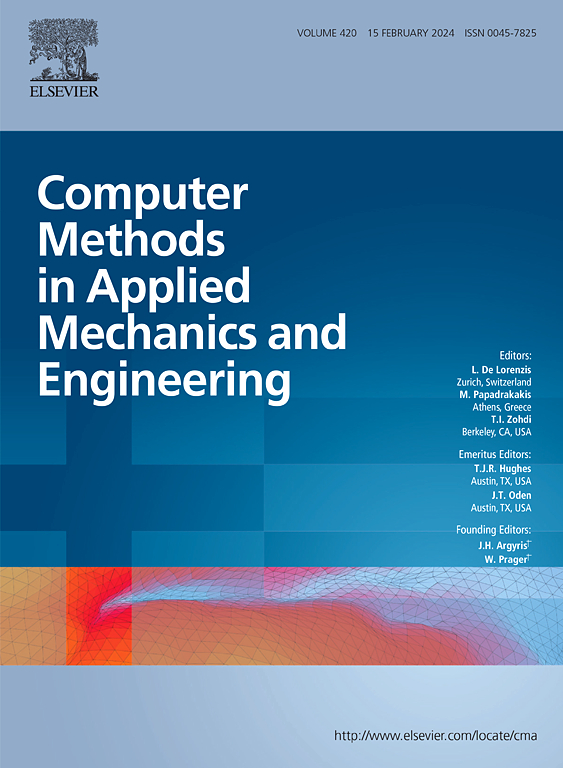贝叶斯框架:通过使用全场测量进行构成模型识别,并应用于异质材料
IF 6.9
1区 工程技术
Q1 ENGINEERING, MULTIDISCIPLINARY
Computer Methods in Applied Mechanics and Engineering
Pub Date : 2024-11-04
DOI:10.1016/j.cma.2024.117489
引用次数: 0
摘要
在本文中,我们提出了一个贝叶斯框架,用于利用全场位移测量来识别非线性材料构成定律的参数。本文采用了基于力的有限元模型更新(FEMU-F)概念,该概念依赖于位移和外力等可测量量的可用性。与传统的 FEMU 相比,所提出的方法通过直接将全场测量的位移信息纳入模型,特别体现了 FEMU-F 的优势。这一特点非常适合软化的异质材料,因为软化的局部区域取决于随机的微观结构。此外,为了考虑测量位移的不确定性,我们将位移视为与构成参数一起需要识别的额外未知变量。然后采用变异贝叶斯方案,在多变量正态分布的假设下,通过近似后验来识别这些未知变量。然后提出一个优化问题并进行迭代求解,目的是最小化真实后验和近似后验之间的差异。所提方法的优点在于其表述的随机性,可以解决与模型参数和测量噪声相关的不确定性问题。我们利用具有路径依赖非线性结构定律的梯度损伤模型,在两个模拟示例中验证了我们提出的框架的有效性。基于非局部等效应变规范,该构成模型可以模拟代表软化和开裂的局部损伤区。第一个例子说明了 FEMU-F 方法在开裂结构中的应用,包括与测量噪声和先验分布参数相关的敏感性研究。在这个例子中,变异贝叶斯求解器与传统的最小二乘法优化器相比,在计算效率方面具有显著优势。第二个示例展示了子域分析,以解决与有限领域知识(如不确定的边界条件)相关的挑战。本文章由计算机程序翻译,如有差异,请以英文原文为准。
A Bayesian framework for constitutive model identification via use of full field measurements, with application to heterogeneous materials
In this paper, we present a Bayesian framework for the identification of the parameters of nonlinear constitutive material laws using full-field displacement measurements. The concept of force-based Finite Element Model Updating (FEMU-F) is employed, which relies on the availability of measurable quantities such as displacements and external forces. The proposed approach particularly unfolds the advantage of FEMU-F, as opposed to the conventional FEMU, by directly incorporating information from full-field measured displacements into the model. This feature is well-suited for heterogeneous materials with softening, where the localization zone depends on the random microstructure. Besides, to account for uncertainties in the measured displacements, we treat displacements as additional unknown variables to be identified, alongside the constitutive parameters. A variational Bayesian scheme is then employed to identify these unknowns via approximate posteriors under the assumption of multivariate normal distributions. An optimization problem is then formulated and solved iteratively, aiming to minimize the discrepancy between true and approximate posteriors. The benefit of the proposed approach lies in the stochastic nature of the formulation, which allows to tackle uncertainties related to model parameters and measurement noise. We verify the efficacy of our proposed framework on two simulated examples using gradient damage model with a path-dependent nonlinear constitutive law. Based on a nonlocal equivalent strain norm, this constitutive model can simulate a localized damage zone representing softening and cracking. The first example illustrates an application of the FEMU-F approach to cracked structures including sensitivity studies related to measurement noise and parameters of the prior distributions. In this example, the variational Bayesian solver demonstrates a sizable advantage in terms of computational efficiency compared to a traditional least-square optimizer. The second example demonstrates a sub-domain analysis to tackle challenges associated with limited domain knowledge such as uncertain boundary conditions.
求助全文
通过发布文献求助,成功后即可免费获取论文全文。
去求助
来源期刊
CiteScore
12.70
自引率
15.30%
发文量
719
审稿时长
44 days
期刊介绍:
Computer Methods in Applied Mechanics and Engineering stands as a cornerstone in the realm of computational science and engineering. With a history spanning over five decades, the journal has been a key platform for disseminating papers on advanced mathematical modeling and numerical solutions. Interdisciplinary in nature, these contributions encompass mechanics, mathematics, computer science, and various scientific disciplines. The journal welcomes a broad range of computational methods addressing the simulation, analysis, and design of complex physical problems, making it a vital resource for researchers in the field.

 求助内容:
求助内容: 应助结果提醒方式:
应助结果提醒方式:


